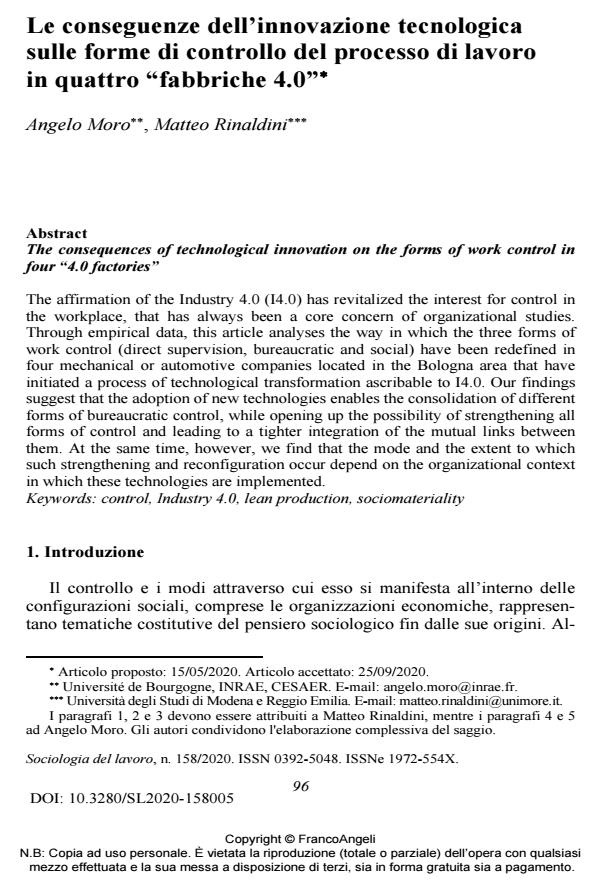The consequences of technological innovation on the forms of work control in four "4.0 factories"
Journal title SOCIOLOGIA DEL LAVORO
Author/s Angelo Moro, Matteo Rinaldini
Publishing Year 2020 Issue 2020/158
Language Italian Pages 22 P. 96-117 File size 299 KB
DOI 10.3280/SL2020-158005
DOI is like a bar code for intellectual property: to have more infomation
click here
Below, you can see the article first page
If you want to buy this article in PDF format, you can do it, following the instructions to buy download credits

FrancoAngeli is member of Publishers International Linking Association, Inc (PILA), a not-for-profit association which run the CrossRef service enabling links to and from online scholarly content.
The affirmation of the Industry 4.0 (I4.0) has revitalized the interest for control in the workplace, that has always been a core concern of organizational studies. Through empirical data, this article analyses the way in which the three forms of work control (direct supervision, bureaucratic and social) have been redefined in four mechanical or automotive companies located in the Bologna area that have initiated a process of technological transformation ascribable to I4.0. Our findings suggest that the adoption of new technologies enables the consolidation of differ-ent forms of bureaucratic control, while opening up the possibility of strengthening all forms of control and leading to a tighter integration of the mutual links between them. At the same time, however, we find that the mode and the extent to which such strengthening and reconfiguration occur depend on the organizational con-text in which these technologies are implemented.
Keywords: Control, Industry 4.0, lean production, sociomateriality
- Industrial democracy between neocapitalism and postfordism. The political and intellectual trajectory of Bruno Trentin (1926-2007) Francesco S. Massimo, in STUDI ORGANIZZATIVI 2/2024 pp.27
DOI: 10.3280/SO2023-002002 - La classe operaia va nel cyberspazio. Il capitalismo di piattaforma oltre i miti della digitalizzazione Marco Marrone, Gianmarco Peterlongo, Giorgio Pirina, in ECONOMIA E SOCIETÀ REGIONALE 1/2021 pp.127
DOI: 10.3280/ES2021-001011
Angelo Moro, Matteo Rinaldini, Le conseguenze dell’innovazione tecnologica sulle forme di controllo del processo di lavoro in quattro "fabbriche 4.0" in "SOCIOLOGIA DEL LAVORO " 158/2020, pp 96-117, DOI: 10.3280/SL2020-158005